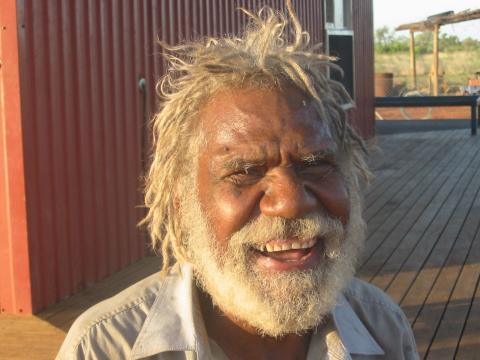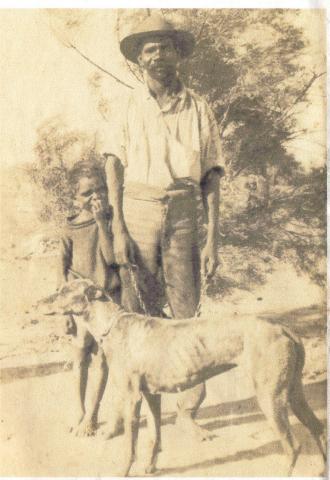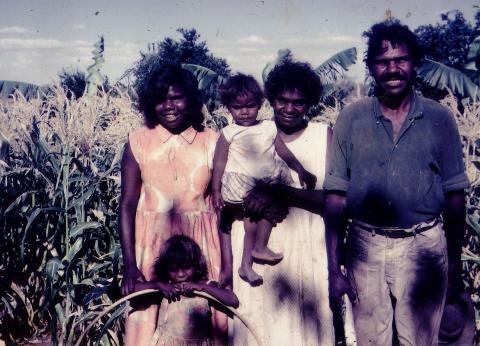Day Day Frank Jakkamarra
Day Day’s Story
Told by D. Frank Jakkamarra and P. Frank Narrurlu
Early Life
Day Day was born in 1933 at Seven Mile, the Telegraph Station. One brother was born at Blue Moon Mine, one sister was born at Phillip Creek, and another brother and sister were born at Banka Banka Station.
At the telegraph Station there were a few Aboriginal people working there as cleaners and cooks and the linemen. But they lived in the bush and they walked to the station every morning. Fridays were the only day that the Aboriginal people had to get rations at the Telegraph Station.
In those days when they had ceremonies at Seven Mile people came from as far as Alroy Downs, Rockhampton Downs, and Banka Banka Station to participate. They traveled by buggies, pack horse, and some walked.
When they travel here and there Aboriginal people shared their stories about the living environment, how they lived and what they had. Like they might say, “We are getting more meat there” Or “We are getting more tobacco there” or “We are getting more clothes there.” That’s how people travel from Mclaren Creek, Mucketty Station, Rockhampton Downs, Seven Mile (telegraph Station) and Six Mile. That’s how they got around for more meat, tobacco, clothes, etc.
In 1932 a Warumungu man found a gold nugget. This was Frank Juppurla, Day Day’s father. It was at Blue Moon mine. Mr. Ted Ward took over Blue Moon Mine and was running the place. Frank was with Ted. He was getting no money but in return the family had free food every day. The Gold Rush was on in Tennant Creek then.
When Blue Moon closed down Ted and Mary Ward bought Banka Banka station. Day Day’s father, Mum and brother moved with them. Day Day’s brother was named after the mine. His name was Bluey and he was born there.
I reckon I was about twelve years old then, at Blue Moon Mine. I don’t know little bit now, up at that mine, I don’t know what they been doing there. I been at the camp and sometime I get up to the mine and look around little bit to see what they were doing there. From there BB station we been go, straight there. We go back, we been go in wagon over there. Wagon from Mr. Ward, my father got that wagon. No bitumen, nothing. Little bit town, police station and bit of shop and two garage I think, Kittles and Jackie Fords, I think.
The Six Mile Aboriginal settlement was built then. It was run by Mr. Long the missionary. There was a school and tin houses and Aboriginal people lived in humpies nearby. Before the Aboriginal settlement was built there was a bread maker living there in a house made out of anthills, ant beds and bread.
There was a racetrack and a pub there. As you go past now you’ll still see old bottles lying around. Europeans called it Pigeon Hole, near Six Mile. From Six Mile people went with buggy and wheelbarrow and packhorses to get rations.
Wumpurrarni people been there and Mr. Long and his wife, Mrs. Long, and that’s all. We been only there might be one year and we head from Blue Moon where we came, we went to Banka Banka then just holiday time, holiday camp. Bread maker was there before people been camping there, before. You can see the brickwork there, still there that brickwork, mud brick, and that bread maker people been there before.
Wumpurrarni mob been camping there, all over the place, all been shipped up from Seven Mile. Everybody been having nanny goats little bit. We been have little bit, maybe about fifty, another one been have fifty.
Station Life
We were at BB station then. Only mother and father, my family, oh a little while grandmother been there and little while and grandpa been going one year there, him go back again and come back again. My grandmothers from here, and my grandfather too from Seven Mile, father’s side grandfather
Grandmother was the first Wumpurrarni person working at the Battery Hill for Mr. and Mrs. Ward. She been working there before they been go to Blue Moon then. She used to ironing and washing clothes. They been camping around somewhere there.
Then army came and I been at Banka Banka too, they camped near there. They was just traveling through and getting meat, always getting one when we were killing. They get a truck and come and take them away. We didn’t get paid, just got the rubbish meat, cuts, to take home.
We always hunting BB station, kangaroo, goanna. And [we had a] holiday camp, Morphett and sometimes, before Morphett we go north a little holiday camp there munjamunja, called. That’s where we been take our family when we finish stock camp, stock work you know and ride home and when the rain come now, holiday, we goin bush now and sometime and just feed’im sometime rations, bit of flour and might come back sometime for meat.
That’s my first job, killing, working outside, pull all the guts out and cut ‘im up and clean‘im up and blood, clean all the bloods. Killing first and the one after that my old man, then army been finished, we went to stock camp then, stock work. Branding and all that, mustering all the cattle, good work, work all the time branding all the cattle and how many cattle we been 4,000 every year branding, big mob and cattle finished branding and ride over fixing paddock and yard, ready for next year.
Sometime later we might get paid hundred dollar. But before two pound a week, before the bore work, stock work then, two pound a week.
Droving cattle from Banka Banka Station to Dijara with packhorses took them a month or two to get there. Day Day and Ted Ward’s grandson took the horses back from Djara to Banka Banka while the others went back home on the truck. Mrs Ward had another station, Long Hill. Another mob go to the station now, one year work there than come back. Me and Jerry Maloney we been go thing, to Mount Isa to get’im bull, come back no bull. Bull too big, we had to leave’im. We had a little Ute, but too big that one. We think little bull, but big one.
I been goin’ that way first Queensland for work, ya know. Been working, with Don Carson. I been went to Alice Springs after that, school then. Then back to Tennant Creek and the outstation, five, six years now, gotta find water first [before they make it any bigger] big mob can come in then, if they can get water. Fresh water from town, fill the fresh water tank.
Now I have outstation. We have a tank, but we need fresh water. Kids come and stay and we might get school of the air for them. So kids can stay.


